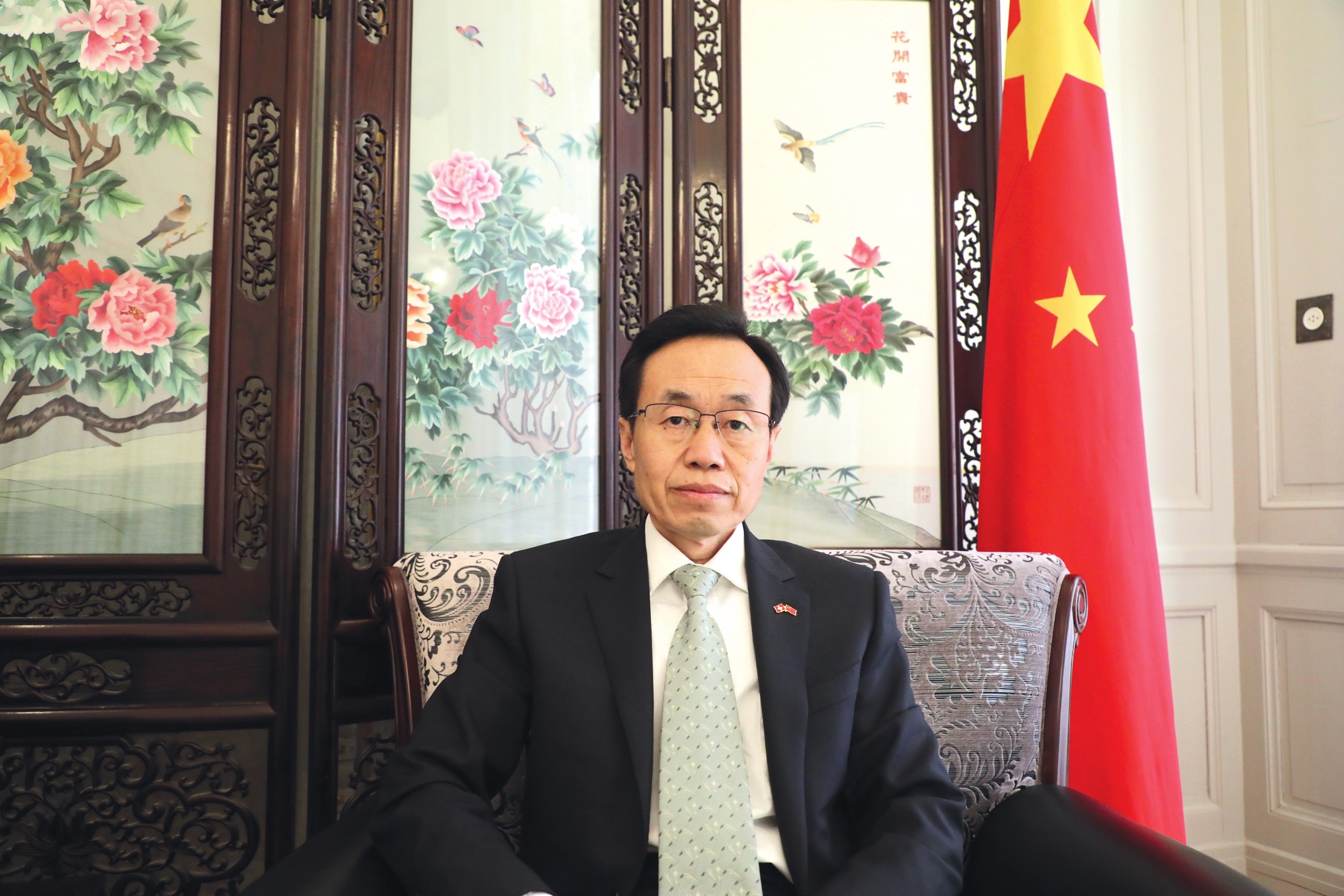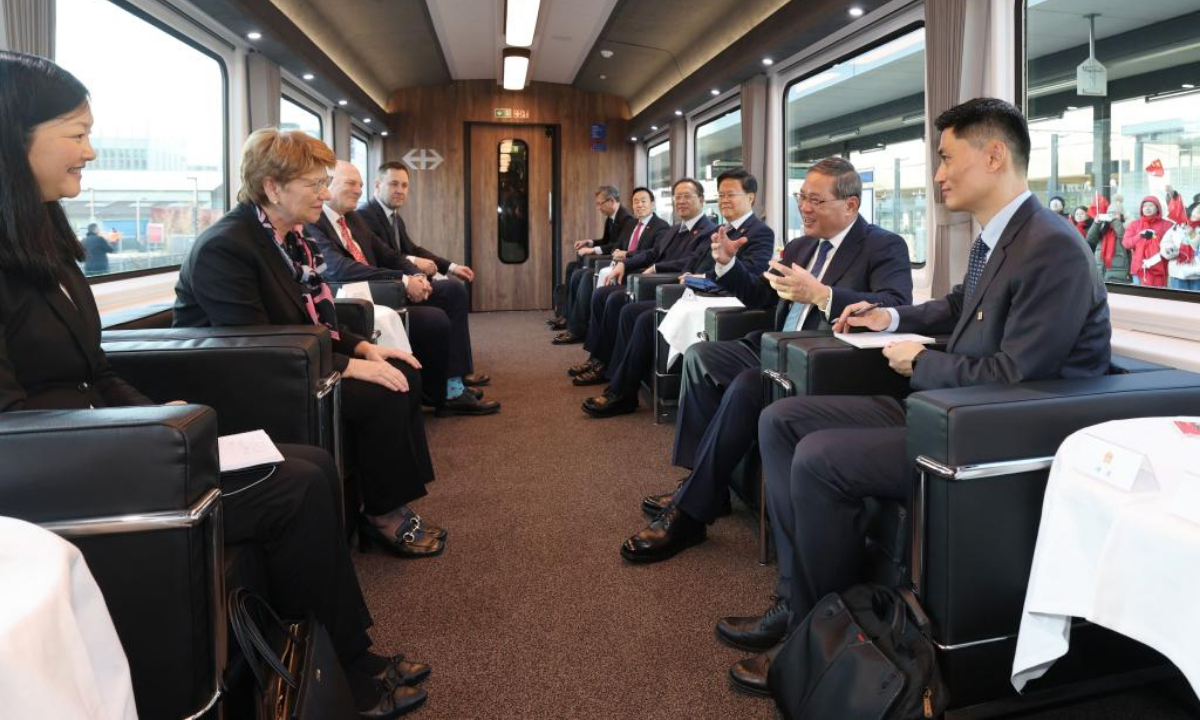
The Bernina Express travels along snowcovered mountains in Switzerland. Photo: VCG

Chinese Ambassador to Switzerland Wang Shihting Photo: Courtesy of the Chinese Embassy in Switzerland
Editor's Note: Chinese Premier Li Qiang recently paid an official visit to Switzerland at the invitation of President of the Swiss Confederation Viola Amherd. When Global Times reporter Zhang Changyue (
GT) had an exclusive interview with Chinese Ambassador to Switzerland Wang Shihting
(Wang), the ambassador talked about the highlights and major achievements of Li's visit, the visit's impact on China-Switzerland relations and China-Europe relations, and the future potential areas of cooperation between China and Switzerland.
GT: How do you evaluate the influence of Li's visit on bilateral relations?
Wang: Li is the first Chinese premier to pay an official visit to Switzerland in 11 years. His visit marks the beginning of high-level exchanges between China and Europe in 2024 and is of great significance in enriching the China-Switzerland innovative strategic partnership and in promoting the stable development of China-Europe relations.
The Swiss side accorded Li a high-profile reception, fully demonstrating the Swiss Federal Government's high regard for the development of relations with China. Amherd personally traveled from the capital Bern to Zurich International Airport to welcome Li and accompanied him on a special train back to Bern. During the visit, Amherd held a grand welcome ceremony for Li. They together reviewed the guard of honor, held official talks with multiple federal councilors including Ignazio Cassis, the Swiss foreign minister, and Guy Parmelin, head of the Federal Department of Economic Affairs, Education and Research.
GT: What were the highlights of Li's visit?
Wang: The three main highlights included deepened political mutual trust, enhanced economic and trade cooperation, and people-to-people exchanges.
During the visit, Li and Amherd exchanged views and reached a broad consensus on bilateral relations, cooperation in various fields, and international and regional issues of concern. Their relaxed and candid exchanges on a special train from Zurich to Bern sent signals of strengthening bilateral high-level exchanges and deepening political mutual trust.
China-Switzerland economic and trade relations remain stable, and Switzerland was the first European continental country to sign a free trade agreement with China. During Li's visit, the two sides signed a joint statement on strengthening economic and trade cooperation between China's Ministry of Commerce and the Ministry of Economy, Education, and Research of Switzerland. They also announced the completion of the joint feasibility study on upgrading the China-Switzerland Free Trade Agreement (
FTA) and agreed to support the early launch of formal FTA upgrade negotiations.China also announced it would waive visa requirements for Swiss nationals while Switzerland said it will offer a streamlined visa process for Chinese citizens and companies, which is a new breakthrough in personnel exchanges. As the two countries will celebrate the 75th anniversary of the establishment of diplomatic relations in 2025, they agreed to take the anniversary as an opportunity to further promote cultural exchanges.

Chinese Premier Li Qiang engages in candid exchanges with President of the Swiss Confederation Viola Amherd in a relaxing and friendly atmosphere on a special train from Zurich to Bern, the capital of Switzerland, January 14, 2024. Photo: Xinhua
GT: What do you think is the key to maintaining a stable and long-lasting China-Switzerland relationship? Will China consider inviting senior Swiss officials to visit China in the near future?
Wang: The key lies in the two countries' cultivation of the spirit of equality, innovation, and win-win cooperation. High-level exchanges between China and Switzerland are very close.
It has become a tradition for China to send high-level delegations to attend the World Economic Forum Annual Meeting and visit Switzerland at the beginning of each year. The negotiation mechanisms in diplomatic, financial, educational, and energy sectors between China and Switzerland are now well established.
During Li's visit, the two sides reached a consensus on holding a new round of strategic dialogue at the foreign ministerial level, meetings of the financial working group, meetings of the energy working group, education policy dialogue, and consultations on UN Security Council affairs within 2024. China's Vice Minister of Commerce Wang Shouwen also delivered an invitation to visit China from Chinese Commerce Minister Wang Wentao to Parmelin.
GT: What role do you think Li's visit to Switzerland will play in promoting the healthy and stable development of China-Europe relations?
Wang: Switzerland was one of the first Western countries to recognize and establish diplomatic relations with China, and Switzerland has always been at the forefront of cooperation with China. Li's visit once again highlights the unique significance of China-Switzerland ties for broader China-Europe relations.
It showed that China and Europe should enhance strategic communication via leaders' meetings and high-level dialogue to promote understanding and properly handle differences, given their different social systems, development stages and sizes. It also showed that China and Europe can engage in high-level friendly cooperation to achieve mutually beneficial and win-win development.
GT: In which areas can China and Switzerland work together to boost China-Europe relations?
Wang: In the political and strategic fields, both China and Switzerland share many areas of consensus, such as supporting multilateralism and promoting political solutions for international and regional issues. They also engage actively in international development cooperation.
In the field of investment and trade, the two countries are making joint efforts to upgrade the free trade agreement. It is believed that the successful experience in economic and trade cooperation will have a demonstrative effect on China-Europe cooperation.
In the areas of science, education and culture, China and Switzerland have made important progress in visa reciprocity measures, especially China's visa-free policy for citizens of multiple European countries. This will continuously stimulate the vitality of scientific, educational, and cultural cooperation and friendly exchanges between the peoples of both countries.






